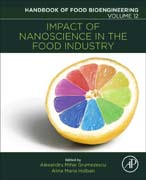
Impact of Nanoscience in the Food Industry
Grumezescu, Alexandru Mihai
Holban, Alina Maria
The Impact of Nanoscience in the Food Industry, Volume 12 in The Handbook of Food Bioengineering series, explores how nanoscience applications in food engineering offer an alternative to satisfying current food needs that cannot be fulfilled by natural products. Nanotechnology enables the development of tailored food ingredients and structures to replace products that are difficult to obtain. The book discusses how specialized nano-preservatives, sensors and food degradation and contamination detectors were developed and how they can be introduced in food products without degrading quality or properties of the final product. A valuable resource for food engineering researchers and students alike. Identifies common nanomaterials used in food preservation and food packaging Provides industrial applications to increase food productionDescribes analytical methods for assessing food safetyIdentifies how nanoscience advances allow for new developments in functional foods and nutraceuticals Discusses safety concerns, regulations and restricted use of nanomaterials in food bioengineering INDICE: 1. Application of Nanotechnology in Food Industry: Present Status and Future Prospectus 2. Nanotechnology: a pioneering rebellion for food diligence 3. Implication of Nano Science in the Food Processing and Agricultural Industries 4. Progress and challenges of nanotechnology in food engineering 5. Nanotechnology trends in the food industry: recent developments, risks and regulation 6. Impact of Nanoscience in Food Industry - Consumer's Health and Regulatory Organisations 7. Functionalised silica nanomaterials as a new tool for new industrial applications 8. Eco-friendly synthesis of metal /metal oxide nanoparticles and their application in food packaging and food preservation 9. Significance of Nanotechnology for sensing, estimation, degradation and formulation of agrochemicals 10. Nanometals as promoters of nutraceutical quality in crop plants 11. Use of Nanotechnological Methods for the Analysis and Stability of Food Antioxidants 12. Stabilized R-alpha-lipoic acid by encapsulation using cyclodextrins. 13. Integrated process control for result oriented process automation 14. Electrospun Polymeric Nanofibers in Food Packaging 15. Use of nanoparticles in the food industry. Advances and perspectives
- ISBN: 978-0-12-811441-4
- Editorial: Academic Press
- Encuadernacion: Rústica
- Páginas: 490
- Fecha Publicación: 13/11/2017
- Nº Volúmenes: 1
- Idioma: Inglés
